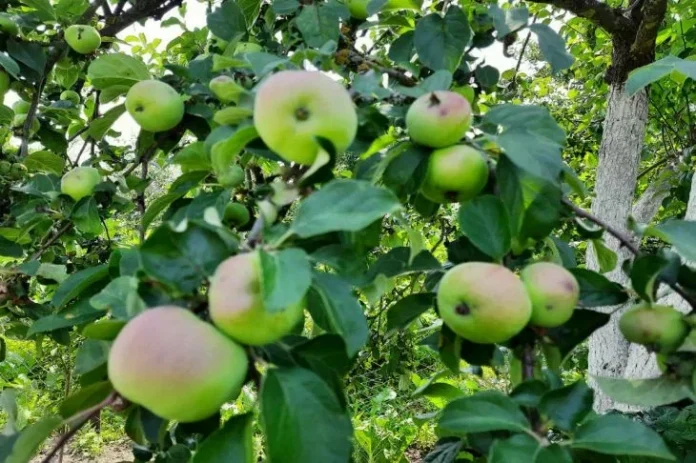If unripe fruits start falling from an apple tree for no apparent reason, this should alert any summer resident.
To stop the ‘apple fall’, the first thing to do is to find the reason why the tree is behaving this way.
Pests
Perhaps the main factor that can lead to massive fruit shedding is the dominance of pests, in particular, the codling moth.
The fight against the codling moth begins long before the harvest – in the spring, when the garden should be treated with insecticides.
Moniliosis
If you notice brown spots on apples that increase in size over time and turn into circles with fungal spores, this is a sign of moniliosis.
Copper sulfate is used for treatment, and prevention involves spraying trees in early spring with 3% Bordeaux mixture, and a few days before flowering – with a 1% solution of the same Bordeaux mixture.
Lack of moisture and nutrition
To prevent apples from falling, trees should be watered rarely, but abundantly.
And to prevent a deficiency of one or another nutrient element, top dressing with a complex mineral fertilizer with a high nitrogen content, which should be applied before mid-summer, will help.
From the second half of summer and in autumn, switch to fertilizers whose main elements are phosphorus and potassium.
If unripe fruits start falling from an apple tree for no apparent reason, this should alert any summer resident.
To stop the ‘apple fall’, the first thing to do is to find the reason why the tree is behaving this way.
Pests
Perhaps the main factor that can lead to massive fruit shedding is the dominance of pests, in particular, the codling moth.
The fight against the codling moth begins long before the harvest – in the spring, when the garden should be treated with insecticides.
Moniliosis
If you notice brown spots on apples that increase in size over time and turn into circles with fungal spores, this is a sign of moniliosis.
Copper sulfate is used for treatment, and prevention involves spraying trees in early spring with 3% Bordeaux mixture, and a few days before flowering – with a 1% solution of the same Bordeaux mixture.
Lack of moisture and nutrition
To prevent apples from falling, trees should be watered rarely, but abundantly.
And to prevent a deficiency of one or another nutrient element, top dressing with a complex mineral fertilizer with a high nitrogen content, which should be applied before mid-summer, will help.
From the second half of summer and in autumn, switch to fertilizers whose main elements are phosphorus and potassium.
If unripe fruits start falling from an apple tree for no apparent reason, this should alert any summer resident.
To stop the ‘apple fall’, the first thing to do is to find the reason why the tree is behaving this way.
Pests
Perhaps the main factor that can lead to massive fruit shedding is the dominance of pests, in particular, the codling moth.
The fight against the codling moth begins long before the harvest – in the spring, when the garden should be treated with insecticides.
Moniliosis
If you notice brown spots on apples that increase in size over time and turn into circles with fungal spores, this is a sign of moniliosis.
Copper sulfate is used for treatment, and prevention involves spraying trees in early spring with 3% Bordeaux mixture, and a few days before flowering – with a 1% solution of the same Bordeaux mixture.
Lack of moisture and nutrition
To prevent apples from falling, trees should be watered rarely, but abundantly.
And to prevent a deficiency of one or another nutrient element, top dressing with a complex mineral fertilizer with a high nitrogen content, which should be applied before mid-summer, will help.
If unripe fruits suddenly begin to fall from the apple tree, this should alert any summer resident..
To stop the apple fall, the first step is to find the reason why the tree behaves this way.
Pests
Perhaps the main factor that can lead to massive fruit shedding lies in the dominance of pests, in particular the apple codling moth.
The fight against the codling moth begins long before harvest – in the spring, when the garden should be treated with insecticides.
Moniliosis
If you notice brown spots on apples that increase in size over time and turn into circles with fungal spores, this is a sign of moniliosis.
Copper sulfate is used for treatment, and prevention involves spraying trees in early spring with 3% Bordeaux mixture, and a few days before flowering – with a 1% solution of the same Bordeaux mixture.
Lack of moisture and nutrition
To prevent apples from falling, trees should be watered rarely, but abundantly.
And to prevent a deficiency of one or another nutrient, top dressing with a complex mineral fertilizer with a high nitrogen content, which should be applied before mid-summer, will help.
From the second half of summer and in autumn, switch to fertilizers whose main elements are phosphorus and potassium.


